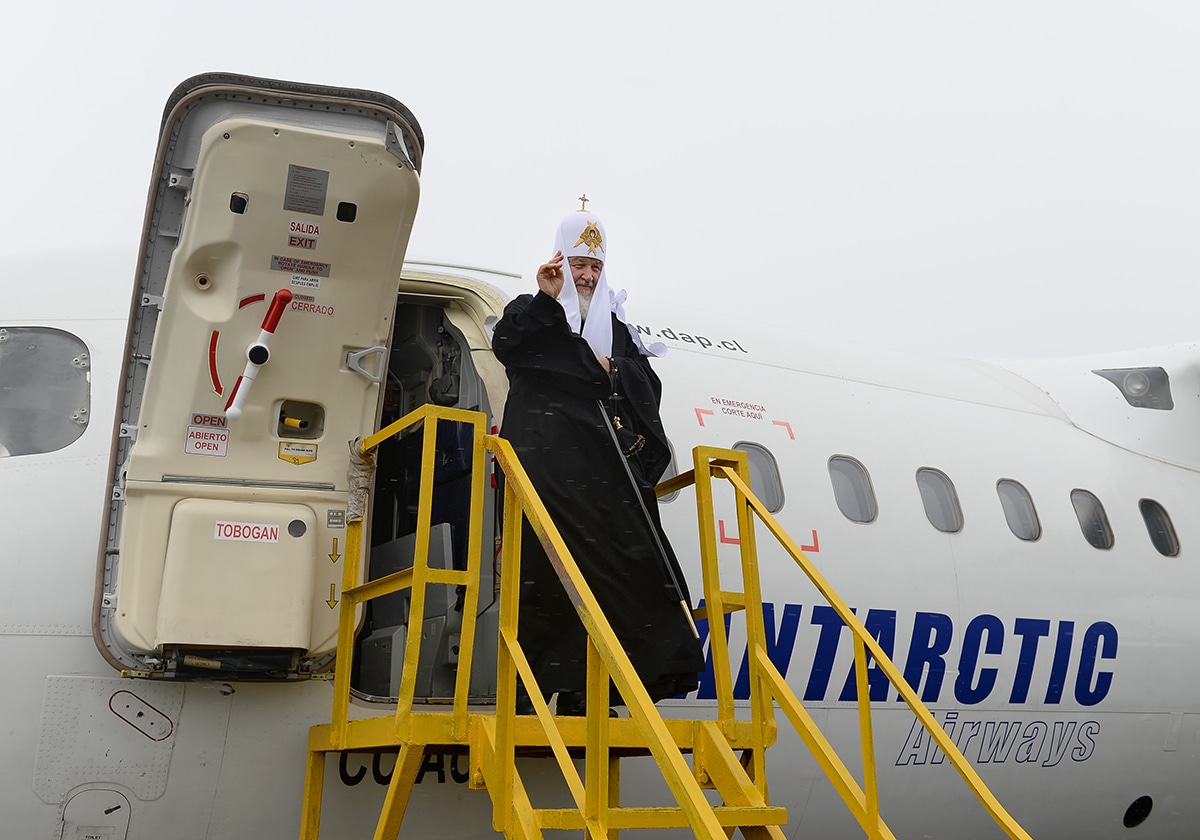Global warming has made hitherto inaccessible frozen regions ripe for commercial exploitation and development. Russia's geographic position has already made the country a major player in the Arctic. [1]Russia is now reasserting its claim to a share of the pie in Antarctica, in the event that it will cease to be an area owned by all mankind. Alexander Tsyganov in an article for the conservative Tsargrad.tv website titled "Russia, so be it, will not take the Baltic states, Turkey and Alaska. But for Antarctica, the battle will be in earnest" where he recounted Russia's discovery of Antarctica in 1820 as the basis for Russia's claim.
Tsyganov's article follows below:[2]

Patriarch Kiril visits Russia's Bellinghausen station in Antartica to recite the Divine Liturgy at the only permanent cathedral in Antartica (Source:Mospat.ru)
"Two centuries ago, Russian sailors discovered Antarctica during an expedition specially organized for this purpose. Nobody canceled the right of the discoverer, but today everyone wants to start dividing the Earth's most remote continent. Everyone, except Russia.
"What is the difference between Russia's temporarily alienated and temporarily lost territories? [The difference is] very important. The former include those that once belonged to the Russian Empire, including during the Soviet period - Finland, the Baltic states, Ukraine, Transcaucasia, Central Asia, Port Arthur ... The latter – are the territories that Russia has discovered, occupied and controlled - Germany, France, the Balkans, Iran, part of Turkey, Alaska, Hawaiian Islands, part of Polynesia. Antarctica.
"Of course we are joking. Times are different now, not "territorial." Empires today are different [they are based on] economy and ideology, not particularly on military [considerations]. So the restoration of the lost territories is not a priority for them today. And why does Russia need today, for example, the Baltic states? Let them go. So it is a joke. Except for Antarctica."
"Russian Antarctica
"Antarctica was first discovered by the Russians. It is they who called not for its partition, but for making it a common territory of humanity, where peaceful scientists will conduct scientific research in the interests of humanity. They are calling for that today.
"The history of the discovery of the last unknown mainland of the planet is still fascinating, specially its background. “Tsargrad” already told the story about it, but let's recall it once again, emphasizing particularly important points.
"There is one particularly important point: although the expedition consisted of two Russian warships (sloops): “Vostok” and “Mirny” under the command of Captain 2nd Rank Thaddeus Bellingshausen and Lieutenant Mikhail Lazarev, it was conceived and planned as a scientific one. The task was set quite clearly:
“To do everything for ... the success of the main goal, which are the possible discoveries in the proximity of the Antarctic Pole.”
"For this purpose, Bellingshausen's expedition was funded on a budget of 100,000 rubles. In order to get an idea of scale for this amount, one can read the works of the contemporary writers: Pushkin or, still better, Gogol. There the price scale is quite picturesque: a pood [16.38 kilograms] of honey cost 12 rubles, two sweet girls [per Gogol] who would weave doilies went for 100 rubles a piece, a minor official of noble birth received 40 rubles a year. And in general, an income of 500 rubles a year was considered at that time respectable enough for the average nobleman.
"There are two especially important points: in those days, the English navigator James Cook enjoyed immense respect. Thaddeus Bellingshausen himself venerated him. So this very same Cook stated categorically: “Most of the southern mainland (assuming that it exists) should lie within the polar region above the southern polar circle, and the sea there is so densely filled with ice that access to land becomes impossible.”
"Therefore, the "risk associated with sailing in these unexplored and ice-covered seas in search of the southern continent is so great that I can safely say that no one will ever dare to penetrate south further than I managed. Lands that may lie the south will never be explored." But, as the history of this voyage showed, the Russian - even if he is German from the Russian Baltic territories - preferred not to believe the world authority, but to verify him. And [by doing so] he inscribed himself and his country in the golden page of the last great geographical discovery on the planet Earth.
"Open Antarctica
"In principle, sailors were already approaching an unknown southern continent. A little less than a year before the Russian sailors, the English merchant William Smith came across Livingston Island from the group of South Shetland Islands south of the 60th parallel. There were other similar discoveries. But it was the Bellingshausen and Lazarev expedition that made the “small round the world” around the new mainland, nine times approaching the pack Antarctic ice and plotting 28 objects on the map. It was the Russian sailors who determined that there is land under the ice, and therefore, we should not talk about the islands, but about a huge chunk of land.
"The very fact of the discovery is described in the diary of the midshipman from “Mirny” Pavel Novosilsky: “At the end of the fourth hour in the afternoon, the sloop “Vostok” gave us a signal that it sees the land. We raise the answer. “Shore! Shore!”- calls from everywhere. One cannot express our joy "At that time, the sun flashed from the clouds, and its rays illuminated the high black rocks covered with snow."
“I call this finding a shore because,” Bellingshausen directly stated later in his report, “the other end of the land disappeared beyond our sight to the south. This shore is covered with snow, but scree on the mountains and steep cliffs did not have snow.”
"In the course of (again I have to repeat, scientific, the discovery) the Antarctic world was described for the first time in history: icebergs 200 meters high, penguins, species of local cetaceans and local birds. The coordinates of the South Magnetic Pole, the temperature of the circumpolar waters were determined, and a map of currents and depths was compiled. In total, 28 islands were discovered, portions of the coastline to which Russian ships approached were mapped.
"Another noteworthy thing (let us call it a particularly important point of three) that until the publication of the description of the expedition in 1831 in St. Petersburg, no one had previously announced not only his discovery of Antarctica, but even about swimming in those places. Moreover, the next voyage to those lands was undertaken only two decades later - after the release of a brief description of Bellingshausen's expedition in Berlin.
"So after that (and partly even in the 20th century) claims were made as to who took priority in this matter. As usual, by the Anglo-Saxons. The Americans announced that a certain Nathaniel Palmer was the first to discover the south polar continent. True, the version smells: firstly, Palmer, even if he actually did discover Antarctica, did not understand that, because he was a simple seal pelt hunter, and secondly, with all his efforts, the Americans could not pull the calendar to the desired date, and Palmer, even if he really saw something, was almost a year later than the Russian expedition in November 1820. And he generally learned about the existence of Antarctica as a mainland ... from Bellingshausen: he invited him to the meeting in the region of the South Shetland Islands.
"However, in some ways the Americans really did enjoy priority. The name bestowed by Bellingshausen on the new land, "Ice Continent," did not stick. And the name "Antarctic Continent", which was assigned in 1840 by the head of the US Navy cartography department, Charles Wilks, is now in usage. At that time Charles Wilks sailed along the coast of Antarctica as part of a wave of Western "discoverers" who discovered a new mainland from a Berlin publication on a Russian expedition.
"Physical Antarctica
"The area of the planet's most southern continent is 14 107 000 km². Not all of it is covered with ice, and about 26.5 million cubic kilometers of ice are concentrated in the Antarctic ice dome itself. This constitutes 80% of all fresh water on Earth. And, as they often write, if all this ice melts, then the level of the World Ocean will rise by almost 60 meters. The Scots will miss London a lot ...
"But whether this is what will be, or not is unknown. But what’s for sure is that Antarctica remains, for the time being, a storehouse of resources, almost untouched by humanity, in a situation where, on all of the other five continents, resources are quickly approaching exhaustion.
"The presence of gold, uranium, iron ore, non-ferrous metals, coal, rock crystal, graphite, mica and so on has already been established under the ice layer there, on the southern “patch” of earth's land. It’s not clear what’s happening with hydrocarbons...
" But the problem with the world's resources (especially water) is growing. In the foreseeable future, there will not be enough fresh water for everyone. Actually, there is not enough water now. And hydrocarbons should be somewhere considering such a large space. More precisely, their reserves in Antarctica are already estimated at between 35 and 51 billion tons of standard fuel. And what will happen to Antarctica if these forecasts are translated into reality? What other famous skyscrapers are left in the USA?"
[The author cites the 1959 Antarctic Treaty that went into force in 1961[3]]
“No acts or activities taking place while the present Treaty is in force shall constitute a basis for asserting, supporting or denying a claim to territorial sovereignty in Antarctica or create any rights of sovereignty in Antarctica
"Yes, but at the same time there is Article IV, in which the following is firmly stipulated:
"1. Nothing contained in the present Treaty shall be interpreted as:
-
a renunciation by any Contracting Party of previously asserted rights of or claims to territorial sovereignty in the Antarctica;
-
a renunciation or diminution by any Contracting Party of any basis of claim to territorial sovereignty in the Antarctica, which it may have whether as a result of its activities or those of its nationals in the Antarctica, or otherwise;
-
prejudicing to the position of any Contracting Party as regards its recognition or non-recognition of any other State’s right or claim or basis of claim to territorial sovereignty in Antarctica. "
"That is, to make it simpler: as long as a certain country has declared its claims to a part of the continent or adjacent sea space before the conclusion of the Treaty, the Treaty does not reject or eliminate these claims. So, the claims of Norway, Great Britain, Australia (which generally claims almost half of Antarctica’s mainland), Chile, New Zealand, France, Argentina remain valid. Moreover, these claims were announced back in the first half of the twentieth century, and therefore from a formal legal point of view, these countries can get the continent at their disposal if something happened to the 1959 Treaty.
"Interestingly, Russia and the United States did not recognize these claims than and do not recognize them now, but one can’t throw words out of the agreement: if it is terminated, they have the right to kick them out of the Antarctic.
"Moreover, it was Russia, in the form of the USSR that invited interested countries to discuss and resolve diplomatically the issue of this region's regime. It was on the basis of this proposal that a conference in Washington was convened in 1959, where an extensive compromise agreement, as we understand today, agreement was worked out.
"Yes the treaty has no time limit, but exiting it is naturally not prohibited. So, potentially the mainland, discovered by Russian researchers, may be at risk of partition followed by the delineation of military borders and then the [borders of] overexploitation. Everyone sees what a terrible state Great Britain and Norway have brought the North Sea to after the oil and gas reserves were discovered on the shelf...
"What can Russia do about it, how can such a scenario be prevented?
"In general, things are still unclear. Precisely on the anniversary of Antarctica's discovery, the All-Russian Fleet Support Movement (DFT) is convening a scientific conference in Moscow on the continent's history and present. Usually, clear and useful practical recommendations on various problems are formulated at such meetings. But can experts this time offer something real? But in any case, one thing is clear: Russia once discovered Antarctica - and it’s her duty to save it. So that the Southern Ocean does not become the North Sea..."
[1] See for example: MEMRI Special Dispatch No. 7995, Special Dispatch No. 7995, Russia This Week – Focus On The Arctic, April 11, 2019.
[2] Tsargrad.tv/articles, January 27, 2020.
[3] https://2009-2017.state.gov/t/avc/trty/193967.htm




